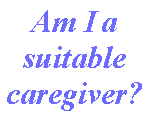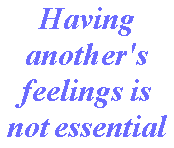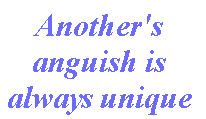I Feel Your Pain
continued from Page 1

Another question arises: Can I care if I do not feel another’s
pain? If I find myself face to face with the brokenhearted, but my feelings
fail to engage, am I a suitable care-giver? When appropriatewords come
out of my mouth but internally I am detached, should my care-credentials
be revoked? Must I feel another’s fear, sadness, discouragement,
in order to effectively speak or pray with them?
The answer is “no”. We are not disqualified for care on the basis of failing to truly resonate to someone else’s personal anguish. Feeling another’s pain, or being emotionally affected, because someone else is in anguish, is not a necessary requirement for care.
Example #1
Sue says: “Dusty, our 18-year-old Siamese
cat, died yesterday. Well, actually, we had to have her put to sleep.
It was so hard to do.”
Care Person (who is both allergic to cats and dislikes them in
general): “Oooh how sad. I’m sure after such a long life
it’s like losing a family member.”
Comment: The Care Person feels no sorrow about the demise of the cat. He speakThis is a caring acts from his head an empathic sentence based on his awareness that this is sad for “Sue”. because it expresses understanding and acceptance, even though his feelings are totally numb to her pain. Most importantly, his words are helpful.
 To
survive very long as a warm caring person, some distancing is necessary.
With little or no capacity to stay somewhat at arm’s length, as was
mentioned earlier, the courage to continue will soon diminish. And the
other probability is what is called burnout. Then the care person
may continue to enter the world of hurting people but slowly be reduced
to robotic-like involvement — a sort of “going through the motions”
kind of living and caring.
To
survive very long as a warm caring person, some distancing is necessary.
With little or no capacity to stay somewhat at arm’s length, as was
mentioned earlier, the courage to continue will soon diminish. And the
other probability is what is called burnout. Then the care person
may continue to enter the world of hurting people but slowly be reduced
to robotic-like involvement — a sort of “going through the motions”
kind of living and caring.
To care, one does need to know a lot about feelings. This
requires more keenness of mind than tender emotions. The devoted care-giver
sees heartache by realizing that what the person has gone through is grievous.
But she may not feel it.
Those who devote themselves to caring for others need to use a lot more than their hearts. That is, care must be more than feelings. Helpful people need to be very thoughtful and even analytic as they enter the lives of hurting folks. And often, good thinking does not coexist with feeling strongly. When the brain engages, emotions may, at least temporarily, recede. Vice versa also: intense feelings can incapacitate keen thinking for a time.
True care zeroes in on what the person needs. That takes thought: assessing what may be helpful, choosing the right words to say, deciding how long to stay, considering whether to touch or hug, considering whether prayer is appropriate, or how to pray. Surging emotions can short-circuit finding the right way to connect. Doing the right thing may require cool well-focused, thoughtful action. Understanding that another is upset or grieved is essential, but having their feelings is not.
Example #2
The pastor has been called to the home of Mr. J. who is under Hospice care and extremely weak. The son who greets him at the door says, “We’re still praying for a miracle.”
The Pastor is thereby confronted with a dilemma about how
to conduct his ministry to this family, a family he knows well and loves.
From the moment he is greeted at the door until he leaves, the Pastor
is thinking hard, assessing the situation, choosing his sentences of prayer
carefully, mindful of those present as well as the sick man.
The pastor is not sad or feeling heartache — he is
endeavoring to do a sensitive task as best he can. His feelings are disengaged.
His care is thoughtfully being worked out in order to do the best pastoral
care he is able to produce.
Truthfully, it is impossible to feel another’s pain. We can be touched
by her distress; his tears can trigger ours. But when we do feel strongly
in the presence of someone else’s heartache, it sometimes means the
stirring up of old distress of our own. Occasionally there may be “unfinished
business” surfacing, either from past history or from fears that
we carry.
Another’s anguish is always unique.
 We
may have had something similar, but it is impossible to know exactly
how it is with someone else. To say, “I understand”,
therefore, rarely finds a receptive ear and is seldom accurate; it is
usually better not said.
We
may have had something similar, but it is impossible to know exactly
how it is with someone else. To say, “I understand”,
therefore, rarely finds a receptive ear and is seldom accurate; it is
usually better not said.
A parent who has lost a child may say, “I know how
you feel” to a mother who is now in such pain and her words are
credible and helpful. But each still hurts in her own way, never exactly
the same.
The helping person gives what the wounded needs, regardless
of her own inner turmoil, preoccupation, weariness or whatever else is
percolating inside her. She may focus intently on the other’s words,
make attentive eye-contact, gently hold her hand, say and pray tender
words of hope and assurance (while her mind – the care-giver’s
– is flitting to her illegally parked car and an appointment for
which she is already late and the likelihood she will need to skip lunch).
Meanwhile the recipient of her care is only being blessed
by this love. It is doubtful the care-giver’s inevitable inner distractions
diminish the goodness of the care very much. Her mind, as well as her
heart, may be elsewhere but her action is healing and spirit calming for
the hurting one.
GOD CAN
Total identification of one to another is exclusively God’s
capacity. God, in Jesus, knows our pain and our joys, I think,
on a perfect correlation.
When Jesus said, “Inasmuch as you do it to one of
the least of these my little ones, you do it to me,” he was making
it clear about where he is for us. When we hurt, he hurts.
When joy lifts us, he is lifted too.
We, as God’s helpers, feel for others more or less.
But in helping, actions speak louder than feelings. It’s
“showing up” and meeting people where we see them
to be, and doing what we can, saying what we believe helpful, that counts.
And it helps a lot.
Dr. James Kok is Director of Care Ministry for the Crystal Cathedral Congregation of Garden Grove, CA. He has been an ordained minister of the Christian Reformed Church of America for 35 years. He speaks extensively throughout the United States and Canada. His hands-on work as a pastor has led to a profound understanding of the issues and dynamics of personal grief and human suffering on which he has written and spoken at length.
Return to Care Capsule Front Page